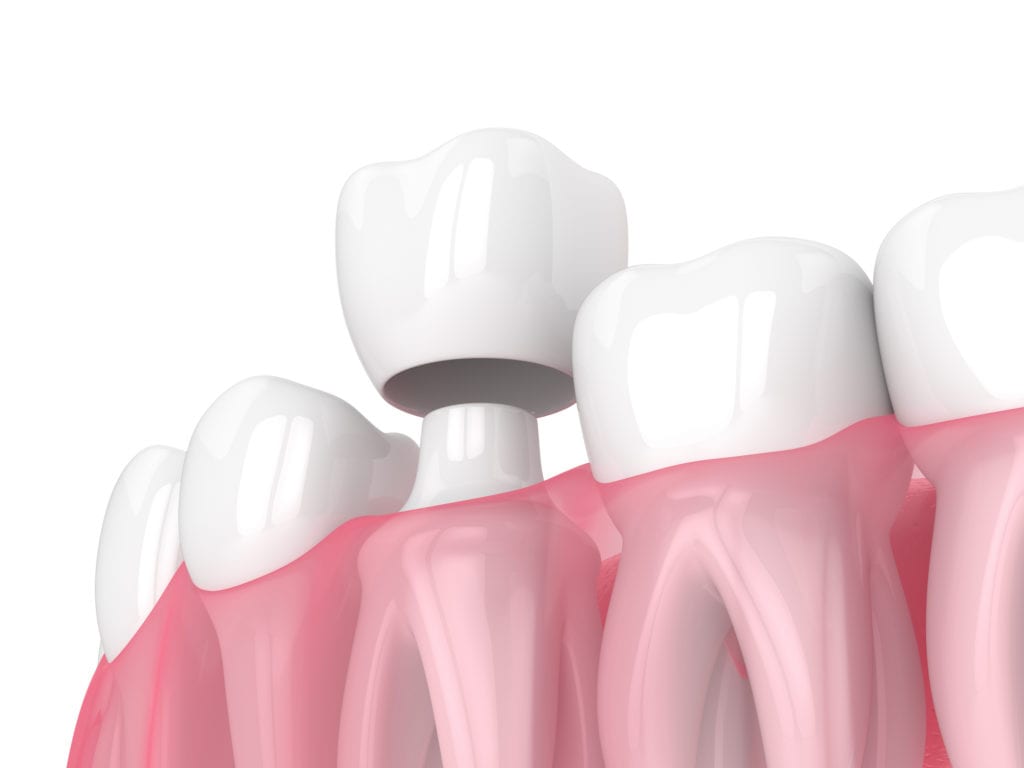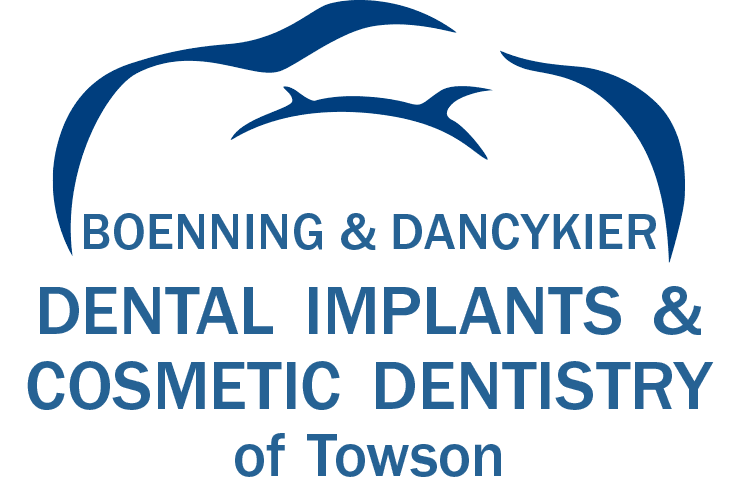Dental crowns are a versatile restorative dentistry treatment that many dentists use to restore teeth. Dr. Keith Boenning and Dr. Nathan Dancykier provide dental crowns in Towson, Maryland. Dr. Boenning and Dr. Dancykier specialize in prosthodontics. They help patients replace missing teeth and protect and restore damaged teeth.
A tooth crown is a popular prosthodontic treatment because it will strengthen a weak or damaged tooth and cap off a dental implant. Receiving dental crowns helps balance the bite and prevent further damage to weakened teeth.

Am I a Candidate for a Dental Crown?
Several factors determine if you are a candidate for dental crowns. These include the condition of your teeth, how severe the damage or decay is, and the current state of your oral health. Fortunately, a dental crown is a versatile dental tool that can address many dental issues. However, to receive one, your dentist will need to make sure that the tooth root is intact.
He will also check if there is enough bone tissue for a dental implant if you are choosing an implant-supported dental crown. If you are missing a tooth, we can help you replace it with an implant that will support a dental crown. We offer bone and tissue grafting to ensure that you have enough support for the dental implant.
Having gum disease or tooth decay will not prevent you from being able to receive a tooth crown. We can provide treatments for dental problems before dental crown treatment and put you on the right track to optimal oral health. These dental conditions or situations may make your dentist suggest a dental crown as part of your treatment plan:
- Tooth decay
- Fractured or broken tooth
- Large dental filling
- After root canal therapy
- Worn down teeth
- Replace a missing tooth (cap off a dental implant)
Receiving a Dental Crown in Towson, MD
Dr. Boenning and Dr. Dancykier work with patients to create a treatment plan tailored to their dental needs and concerns. First, we will examine the affected tooth to determine if a dental crown is the appropriate treatment option.
The next step is to prepare the tooth. Your dentist will prepare the tooth by removing the decay and damaged portion of the tooth. Then they will shape the tooth to create room for the dental crown. If the tooth is severely damaged, we may need to remove additional tooth structure to ensure a proper fit.
Once your tooth is ready, we will take several dental impressions. We will send a mold to a dental lab where they will fabricate a natural looking dental restoration. We will also use the impressions to make a temporary crown for you to wear. The temporary will protect your tooth until the permanent crown is ready.
After a few weeks, you will return to our Towson dental office. Our dentist will make sure your new dental crown fits well and looks natural. We will remove the temporary restoration and bond your new dental crown to the tooth for a secure fit.
Replacing a Tooth with an Implant-Supported Dental Crown
An implant-supported crown can replace a single lost tooth. First, we will surgically place the dental implant into your mouth. Then we will wait for your mouth to heal and the implant post to integrate with the jaw bone. While we wait, we will design the dental crown, which our dental lab fabricates to our specifications.
The dentist will attach an abutment to the implant and use it to anchor your permanent dental crown. We always ensure that our restorations are comfortable and fit precisely.
Inlays and Onlays
Inlays and onlays can also restore teeth, however they are slightly different than dental crowns. They are indirect tooth fillings that the dentist bonds onto damaged or decayed teeth. A dentist will choose to use an inlay or onlay when the damage to a tooth is too extensive for a traditional dental filling. But not quite bad enough for a full dental crown.
They are a conservative dental restoration to preserving the natural tooth. However, inlays and onlays serve a similar purpose. They strengthen teeth and protect them from more damage and decay. Your dentist will also go through similar steps to fabricate them.
- Inlay: This type of dental restoration will repair damage or decay that is limited to the center of the tooth’s biting surface. It does not extend to the cusps portion of the tooth. The inlay will fit snugly within the prepared space and then bonded to the surface of the tooth.
- Onlay: This type of dental restoration is best if the damage or decay extends beyond the biting surface of the tooth. It does include one or more cusps and typically will cover a larger portion of the tooth’s surface compared to an inlay. For this reason, dentists also refer to onlays as partial crowns. An onlay fits perfectly on the prepared tooth for a natural appearance.
Dental Crown FAQs
A dental crown is a great dental treatment to restore a weakened or damaged tooth. However, the process to receive one can seem overwhelming for some patients. To learn more about them, read through our frequently asked questions section. Contact us if you have further questions or concerns about dental crowns.
How long will my dental crown last?
Ultimately, how well you maintain it will determine the longevity of your crown. Maintain excellent and proper oral hygiene habits, follow all your dentists instructions, and visit your dentist regularly. If you think you may be having an issue with your dental crown, you should schedule an appointment right away to have it addressed. On average, you dental crown should last you about 5 to 15 years.
Is it better to get a dental crown or just have my dentist pull the tooth?
Your dentist will try to save a tooth with a tooth crown rather than extract it. In cases of extreme decay, extraction may be the best option to prevent the spread of infection and further damage to adjacent teeth. However, if only mild tooth decay is present, your dentist should use a tooth crown to preserve the natural tooth structure. Ultimately, your dentist will recommend what is best for you based on your condition.
Can I eat a normal diet with a dental crown?
Yes, you can consume food normally with a dental crown. However, you should avoid hard and sticky foods such as candy, nuts, and chips for 24 hours after the procedure. These foods may damage or dislodge your tooth crowns. You should practice good oral hygiene, including brushing and flossing, to help maintain the health of your teeth.
Can my dentist remove my dental crown?
Yes, a dentist can remove a tooth crown. If your tooth crown becomes loose or falls out, your dentist may need to replace it. A dentist may need to remove a crown if it’s causing irritation to the gum tissue or if there’s a problem with the tooth.
Your dentist will use an instrument to hold the crown and then unscrew it from its connection to the abutment. During this step, the dentist to take caution and not damage any teeth or other surrounding structures. After removing the crown, your dentist will remove any remaining temporary cement with an ultrasonic scaler or hand instrumentation.
Does getting a dental crown hurt?
In most cases, getting a dental crown does not cause significant pain. However, some people may experience some mild sensitivity after the procedure. This is usually temporary, and you can manage it with over-the-counter pain medication. Your dentist will use a local anesthesia to ensure you don’t feel pain or discomfort during the procedure.
How much do dental crowns cost?
The cost of a dental crown or crowns will vary depending on where they are in the mouth, the materials, and how many dental crowns you need. Some insurance companies cover dental crown treatment. We will help you submit your claim and help you determine your coverage before your procedure. Dr. Boenning or Dr. Dancykier will help you determine the cost of your treatment when they create your treatment plan.
Will my dental insurance cover a dental crown?
In most cases, dental insurance will cover some of the cost of a dental crown. Dental insurance policies cover a portion of the cost of most preventive and restorative procedures. Dentists most often use a dental crown to restore a tooth or protect a tooth from further damage. In this case, most dental insurance companies will cover some of the cost of the procedure.
However, many dentists may suggest a dental crown for cosmetic purposes, such as to improve the appearance of teeth. In these cases, the insurance company will most likely not cover any portion of the procedure. You should check with your dental insurance provider to see what procedures your policy covers. They should be able to provide you with information about your specific coverage and any applicable deductibles or copays.
Schedule an Appointment for a Dental Crown in Towson, MD, Today!
Do you have fractured or cracked teeth? Are you looking for a dental restoration for one or more teeth? Try a dental crown in Towson, MD and Timonium, MD. Call our office at 410-324-2294 or request an appointment with one of our dentists on our website.
